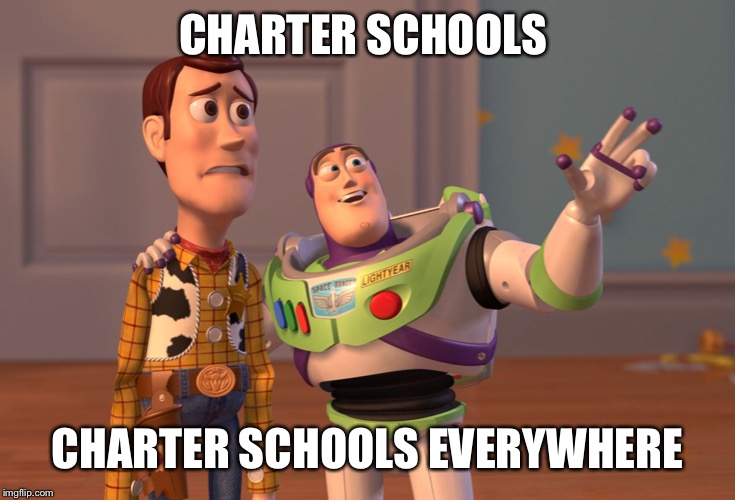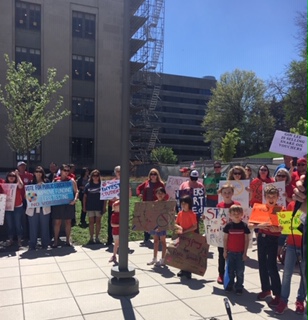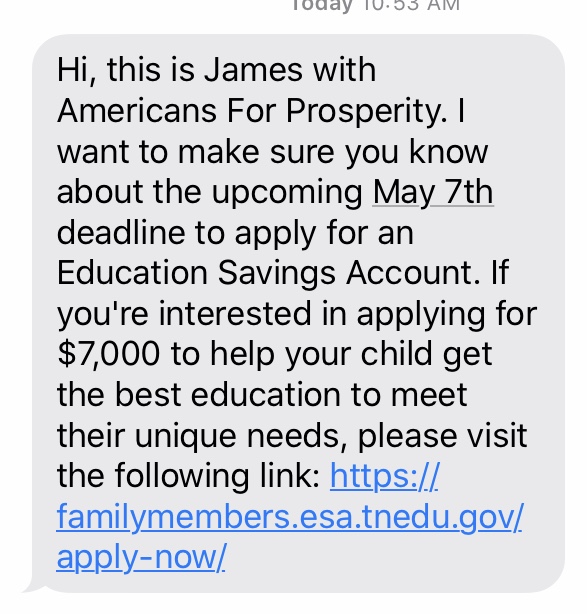From NewsChannel5+
For more on education politics and policy in Tennessee, follow @TNEdReport
A new story out of the Tennessee Department of Education indicates more turmoil among staff there under the leadership of Commissioner Penny Schwinn. Here’s more from Chalkbeat:
The leader of Tennessee’s new “whole child” initiative that includes anti-bullying programs has been demoted and reassigned after an investigation found she verbally abused employees under her supervision at the Department of Education.
Katie Houghtlin has been stripped of her title as assistant commissioner, as well as her responsibilities managing personnel. She is now handling special projects for Education Commissioner Penny Schwinn, who recruited her from Texas where they previously worked together.
According to a summary of an investigation obtained by Chalkbeat, a state investigator found that Houghtlin “utilized verbal abuse, micromanagement, as well as harsh and inappropriate treatment” toward a staff member who later filed a complaint, as well as toward other employees.
An earlier story noted that Schwinn had been involved in the termination of a whistleblower during her time in a leadership post at the Texas Education Agency:
Federal officials have ordered the Texas Education Agency to pay a former special education director more than $200,000 in damages for illegally firing her.
Laurie Kash filed a federal complaint Nov. 21, 2017, with the U.S. Department of Education, claiming the TEA had illegally awarded a no-bid contract to a company to analyze private records of students receiving special education services.
Less than a month after firing Kash, the TEA ended its no-bid special education contract — losing millions of dollars — and promised to review its own contracting processes. A year later, state auditors found the TEA had failed to follow all the required steps before awarding the contract.
It also had failed to identify the personal relationship between the subcontractor and the main decision maker for the contract: Penny Schwinn, who was then the agency’s deputy commissioner of academics.
Seems like a pattern is emerging.

For more on education politics and policy in Tennessee, follow @TNEdReport
Your support – $5 or more — makes publishing education news possible.
This article on school privatization efforts in Tennessee originally appeared in The Progressive.
What’s the cure for COVID-19 in schools? Charter schools, of course!
Budget cuts on the horizon because of the economic damage caused by weeks of stay-at-home orders? Sounds like your districts need more charter schools.
Concerned about what the 2020-21 school year might look like?
Charter. Schools.
When it comes to public schools, Tennessee’s answer to the COVID-19 pandemic has been clear and simple: Privatization.
First, in mid-March, Governor Bill Lee chose to include millions of dollars for a new voucher scheme in his emergency budget before the legislature left Nashville due to the coronavirus. How’d he pay for it? By cutting a planned investment in teacher compensation.
Now, as Tennessee’s two largest school districts, Memphis and Nashville, face significant budget shortfalls for the upcoming school year, the possibility of the state forcing unwanted charter schools on them looms large. These new charters would eat up valuable district resources at a time when funding is scarce. They also will come in the two districts where the state’s “Education Savings Account” voucher scheme will pilfer public dollars for privatizers.
In 2019, the newly-minted governor pushed for and won approval of a State Charter School Commission. This new body will have broad authority to grant charters to schools—even those schools denied a charter by local school districts. If the state body approved a charter school, the commission would manage the school, but the funding for that school would come from the local district.
In other words, whether or not Nashville or Memphis want more charter schools, the Charter Commission can approve and locate a charter in any district in the state without the approval or consent of the local board—then mandate that the local board spend funds to support it.
Fast forward to May 2020.
Right now, Education Secretary Betsy DeVos is pushing a scheme whereby states can acquire additional federal stimulus funds for education if they agree to advance a school privatization agenda.
Enter the Tennessee Charter School Commission. While Nashville and Memphis have taken a cautious approach to charter school approval in recent years, the Charter Commission, stacked with Governor Lee’s handpicked privatization proponents, seems primed to put charters where they aren’t wanted.
Obligating districts to fund charters would also divert money that they need to provide resources for students if a second wave of COVID-19 wreaks havoc this fall. Nashville is already staring down a $100 million budget shortfall for education, and Memphis is considering a tax increase just to maintain its school system.
How much of a financial bite will new charter schools take from these struggling districts?
That’s hard to calculate exactly. But in 2014, a study conducted by independent research firm MGT of America predicted that “new charter schools will, with nearly 100 percent certainty, have a negative fiscal impact” on Nashville’s school district. MGT calculated a price tag that could exceed $300 million in direct costs to the city’s public schools over a five-year period.
A more recent study in North Carolina found that the financial burden of adding charter schools to one urban county school district, Durham, was between $500 and $700 per student. In rural districts in the state with fewer charters, the impact was less negative but still significant—up to $300 per student.
Added to the estimated cost of charter schools in Tennessee is a whole new disaster: a voucher scheme. Though this program was ruled unconstitutional by a judge on May 5 (and will no longer start next year, as initially planned), it revealed the true aims of education reformers in the state.
By forcing charters on cash-strapped districts, DeVos and Lee are using the chaos caused by COVID-19 to advance a privatization agenda. Something similar happened when public schools were hollowed out in New Orleans, post-Katrina.
DeVos, in a statement on May 4, put it diplomatically:
“The current disruption to the normal model is reaffirming something I have said for years. We must rethink education to better the realities of the twenty-first century. This is the time for local education leaders to unleash their creativity and ingenuity.”
Lee, a longtime financial supporter of DeVos, recently made the same point, in language that’s just as mystifying. “The Department of Education has a clear directive to challenge the status quo by developing solutions that best advocate for students and teachers,” Lee said.
The COVID-19 crisis has created new opportunities for profit-seeking privatizers to prey on public education. We must continue shining a light on those working to undermine public schools, so that we can continue fighting for the public good.

For more on education politics and policy in Tennessee, follow @TNEdReport
Your support — $5 or more today — makes publishing education news possible.
A statement from the Tennessee Parent Teacher Association on last week’s court ruling that killed (for now) Gov. Bill Lee’s voucher program:
Tennessee PTA was excited to hear that Davidson County Chancellor Anne C.
Martin declared the Educational Savings Account statute unconstitutional. We were disappointed in Governor Lee’s funding cuts to education while maintaining $40 million for the ESA program in the most recent budget and request legislators reevaluate the needs of our public schools during this challenging time and move the funding for the ESA program back to the public schools.
The Tennessee Parent Teacher Association (PTA) stands in opposition to any form of voucher programs. Tennessee PTA believes our elected leaders must provide all Tennessee children with access to a quality public education. Public schools provide education to 90% of our country’s students and voucher programs such as this educational savings account program undermine our public schools by diverting desperately needed resources away from the public school system. Tennessee PTA recognizes that changes need to be made within the public schools to provide an equitable and excellent educational opportunity for every child. Vouchers, educational savings accounts, and other similar options do not provide the means for bringing about improvements in our public schools. Voucher programs have often proven ineffective in
improving student outcomes, lack accountability to taxpayers and students, create inequality, and place the individual rights of students at risk.
Kim Henderson
Tennessee PTA President

For more on education politics and policy in Tennessee, follow @TNEdReport
Your support — $5 or more — makes publishing education news possible.
Wilson County education advocate Kristi Dunn reports on a proposed budget for Wilson County Schools that includes some pretty steep cuts. Here’s her summary:
Yesterday was a work session for the Wilson County BOE ti discuss the upcoming budget. It was ugly and disappointing to the day the least. Our economy has taken a hit due to decrease in sales tax revenue, construction, tourism and property taxes. We have a $10.5 million deficit in the education budget to make up. The solution being proposed is to cut 41 high school teaching positions, 95 EAs, buy no textbooks, cut our Adult High School program which helps at least 145-150 students get their diploma a year, cut adult basic education program, cut all coaching stipend, mentoring stipends, all stipends for any band director, etc, no early retirement incentives.
The proposal comes just ahead of the return of the Tennessee General Assembly in June. At that time, legislators may decide to reinvest money previously allocated for Gov. Bill Lee’s now dead voucher scheme.
Additionally, a new report from Education Week indicates that districts across the country will face significant cuts due to the economic impact of COVID-19.
Almost half of the nation’s 13,000 school districts may be forced to make the deepest cuts to education spending in a generation—slashing programs and laying off hundreds of thousands of administrators, teachers and other staff—to fend off financial collapse brought on by the coronavirus.
“What’s so stunning about this recession is that poor districts are going to bear the brunt of these cuts because they rely so heavily on state aid and they don’t have the capacity to raise their property taxes,” said David Sciarra, the executive director of the Education Law Center, a law firm and advocacy organization which has sued states for having inequitable funding systems.
It will be interesting to see how lawmakers handle school funding in the mini-session and going forward.

For more on education politics and policy in Tennessee, follow @TNEdReport
Your support — $5 or more — makes publishing education news possible.
The Southern Poverty Law Center celebrates victory in case that is stopping the implementation of a voucher scheme in Tennessee. Here’s more:
When Lisa Mingrone taught art in a Tennessee school, her “supply budget” only provided students with a box of crayons, far short of the full range of art supplies they needed for the whole year.
Now a parent of a child in the Metro Nashville Public Schools, Mingrone has an even deeper understanding of the lack of resources – including a dearth of educators – in public schools. Those scant resources in Tennessee public schools were recently at an even greater risk of evaporating after the state Legislature narrowly passed a private school voucher program that threatened to drain more public money from two of the 95 counties in the state.
Mingrone and others scored a milestone victory this week when a judge blocked Tennessee from implementing the voucher program. The ruling came as the program is challenged by two lawsuits, including a lawsuit brought by the Southern Poverty Law Center and its partners.
The victory stopped a voucher program that was poised to siphon off more than $7,500 per voucher student – more than $375 million in the first five years of the program – from funds dedicated for the Metro Nashville Public Schools and Shelby County (Memphis) Schools. Three days after the initial ruling, the judge ruled that the state could not implement or spend any money on the voucher program during the appeal.

For more on education politics and policy in Tennessee, follow @TNEdReport
Your support — $5 or more — makes publishing education news possible.

House Democrats are calling on Gov. Bill Lee to return the money for his now stalled voucher program, saying it should be invested in teacher compensation as originally planned.
Here’s more from a press release:
The TN House Democratic Caucus says the more than $38 million dollars in state funds that Governor Bill Lee earmarked in the 2020 budget for his controversial voucher program should be immediately reallocated. The Caucus also encourages the Governor not to appeal the Chancery Court’s ruling. On Thursday, the Davidson County trial court ruled that the Lee administration cannot continue processing applications for the program. The state wanted to continue to prepare to launch the program this upcoming school year while appealing the court’s initial ruling against the State, which found the voucher program unconstitutional because it only targets Nashville and Memphis, the state’s two largest cities.
Democratic lawmakers say it’s fiscally irresponsible to set aside millions for an unconstitutional program and continue with a losing lawsuit amid a severe economic crisis. As the state forecasts an estimated $514 million dollar shortfall in the current budget year and $1.5 billion in next year’s budget, Democrats believe the vital funds should be redirected to fill the funding gap in our public school’s budget. Caucus members say the State has demonstrated a pattern of irresponsibility when using taxpayer dollars to fund bad decisions in education like the almost $1 billion dollars used to fund the failed ASD experiment and the botched launch of the TN Ready proficiency testing system.

For more on education politics and policy in Tennessee, follow @TNEdReport
Your support — $5 or more today — makes publishing education news possible.
So, apparently, Americans for Prosperity paid for a texting campaign that reached a number of Nashville residents today. The focus: Signing up for Tennessee’s voucher program. The problem, of course, is that just YESTERDAY, that same program was halted by a Nashville judge as it was ruled unconstitutional. It seems like someone at Americans for Prosperity would have been aware of this and cancelled the campaign. Or, maybe prosperity just means the ability to waste ALL the money?!
Here’s the text:

Someone should maybe tell James about all this.
For more on education politics and policy in Tennessee, follow @TNEdReport
Your support — $5 or more — makes publishing education news possible.
Yesterday, a judge in Nashville found that Tennessee’s voucher law is unconstitutional. This effectively kills Gov. Bill Lee’s signature legislative achievement and means there won’t be a voucher program in the 2020-21 school year or anytime in the near future.
Here’s a nice summary of the essence of the decision thanks to WPLN:
“The Court finds, based upon the particular criteria in the ESA Act, and upon the legislative history detailing the extensive tweaking of the eligibility criteria in order to eliminate certain school districts to satisfy legislators (rather than tweaking to enhance the merits of the Act) that the legislation is local in form and effect,” Martin ruled. “Additionally, the legislative history of the General Assembly’s consideration and passage of the ESA Act confirms that the Act was intended, and specifically designed, to apply to MNPS and SCS, and only MNPS and SCS.”
As such, Martin found that the law violates the Tennessee Constitution’s Home Rule Amendment.
Read the rulings here and here
Gov. Bill Lee indicated the state’s legal team will immediately appeal the decision.
The ruling raises questions about what comes next for a program Lee deemed so essential he funded it in his emergency COVID-19 budget while simultaneously slashing a planned investment in teacher compensation.
Also worth asking: What happens to the $2.5 million no-bid contract awarded to ClassWallet to oversee the doomed program?
The General Assembly seems likely to return for a brief session in early June. Perhaps they’ll redirect the voucher funds BACK to public schools.

For more on education politics and policy in Tennessee, follow @TNEdReport
Your support — $5 or more — makes reporting education news possible.
Derek Black and Education Law Center have the breaking news: A Tennessee judge has found the state’s voucher program unconstitutional.

For more on education politics and policy in Tennessee, follow @TNEdReport
Your support — $5 or more today — makes publishing education news possible.